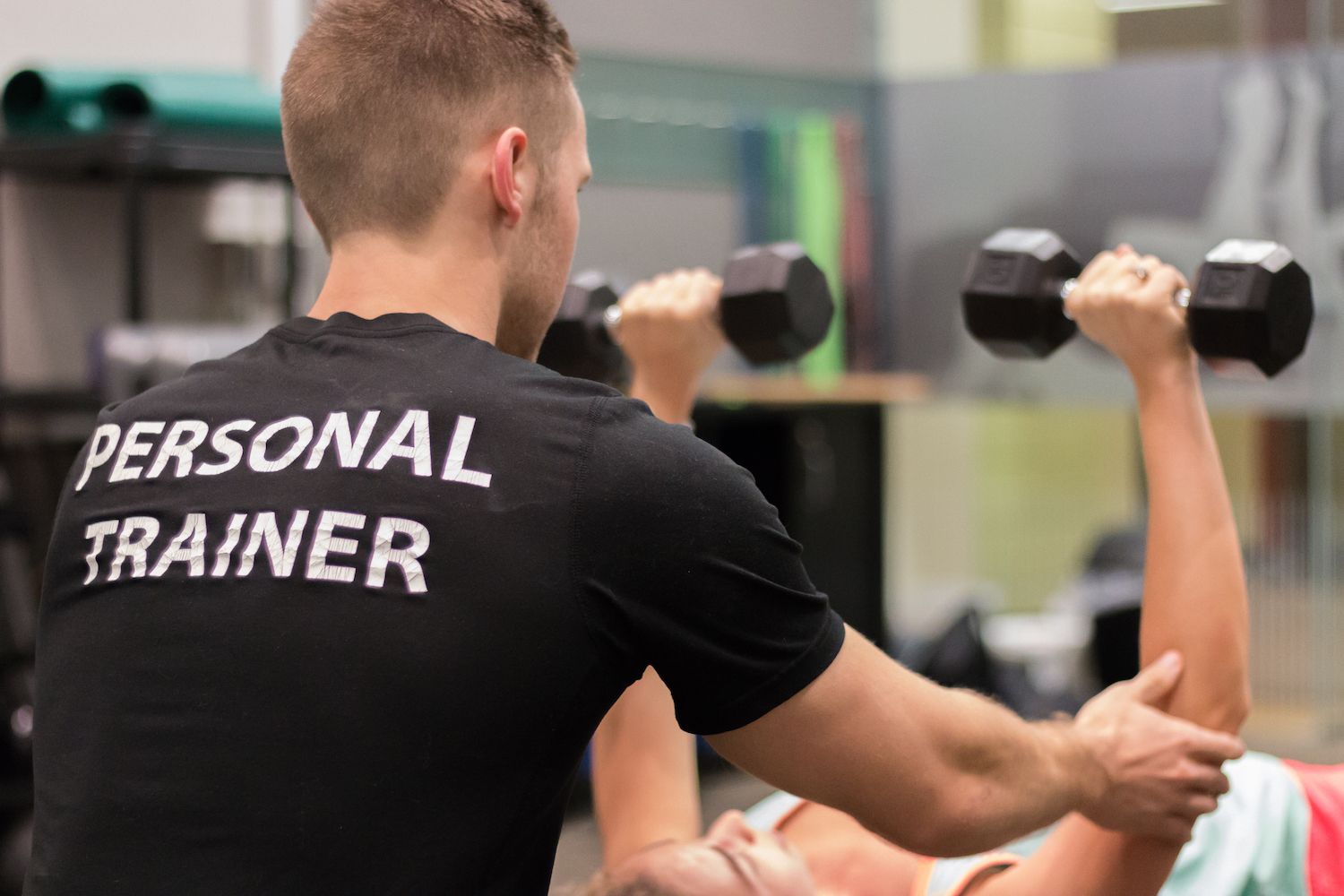Understanding how to become a personal trainer in the UK involves obtaining a Level 2 Certificate in Fitness Instructing and a Level 3 Certificate in Personal Training, both recognized by REPs or CIMSPA. A personal trainer works with clients to help them achieve their fitness and health goals. Personal trainers design and implement fitness programmes that encompass exercise, nutritional advice, and lifestyle coaching to assist clients in improving their health, reaching fitness targets, and enhancing their quality of life.
If you love fitness, enjoy working with people, and want to help others lead healthier lives, then a career as a personal trainer could be for you. This guide will detail the path to becoming a personal trainer in the UK, the qualifications you’ll need, and some tips on how to build a successful career in this field.
What Does a Personal Trainer Do?
Personal trainers get to know their clients and design a fitness plan to suit their health needs, fitness levels, and preferences. Some personal trainers work for gyms, while others work freelance. Regardless, personal trainers play a crucial role in helping clients live healthier lifestyles. The main responsibilities of a personal trainer include:

- Fitness assessments and goal-setting: Personal trainers start by conducting fitness assessments to evaluate clients’ physical capacities and benchmark their fitness levels. They also discuss health goals with their clients, such as reducing body mass index, gaining lean muscle mass, or increasing overall fitness levels. This allows them to create individualised workout programmes and schedules.
- Planning tailored workouts for the client: Depending on the client’s fitness level and goals, the trainer develops an exercise plan that may include cardio workouts, strength training, flexibility exercises, and functional fitness activities, altering it as the client progresses.
- Demonstrating correct form: Personal trainers show clients how to exercise correctly to avoid injury and maximise workouts, adjusting form during sessions to ensure exercises are performed properly.
- Motivation and encouragement: Motivation is a vital part of the role. Encouraging clients is a significant aspect of what personal trainers do to aid and support them.
- Monitoring progress and adjusting programmes: Trainers monitor clients’ progress by regularly assessing outcomes such as weight loss, strength, or endurance, and then adjust the exercise programme and goals accordingly.
- Offering nutrition and lifestyle advice: Many personal trainers provide diet and general well-being advice. While they should not be confused with nutritionists, personal trainers often offer foundational guidance on balanced nutrition, hydration, meal planning, and other factors to help clients reach their fitness goals.
- Managing client relationships and schedules: Regardless of whether a personal trainer works independently or at a gym, they schedule client appointments and track schedules and payments. Trainers may also market and network for new clients.
Average Personal Trainer Salary in the UK

The salary of a personal trainer in the UK can vary significantly based on factors such as experience, location, and whether you work independently or for a gym. Entry-level personal trainers typically earn between £16,000 and £22,000 per year when employed by a gym.
Freelance personal trainers or those with a strong client base can earn significantly more, with hourly rates ranging from £25 to £80 per hour, depending on location and expertise. Experienced personal trainers in high-demand areas such as London or those working with celebrities and athletes can earn upwards of £50,000 to £70,000 per year or more.
Key Skills for a Successful Personal Trainer
It takes a combination of fitness knowledge, communication skills, and business acumen to be successful as a personal trainer. Here are the most important skills required to be a personal trainer:
- Advanced knowledge of fitness: A personal trainer must understand basic exercise physiology, anatomy, and kinesiology to create effective workout plans. This knowledge ensures that exercises are performed safely, reducing the risk of injury. Trainers should stay updated on the latest fitness trends and techniques. They also need to tailor programmes based on individual client needs. A solid foundation in fitness science is crucial for client success.
- Strong communication and interpersonal skills: A personal trainer must be able to clearly explain the techniques of each exercise, ensuring clients understand proper form. Providing constructive feedback on movement is essential for progress and safety. Building a positive rapport with clients fosters trust and motivation. Active listening is equally important to grasp clients’ goals and concerns. Strong interpersonal skills enhance the overall training experience.
- Motivation and coaching skills: Motivating clients to train hard is a key aspect of a personal trainer’s role. You must instil confidence and encourage them to push through challenging workouts. Understanding the psychological barriers clients face can help you provide tailored support. Recognising and celebrating small achievements keeps clients engaged. A positive coaching style helps clients stay committed to their fitness journey.
- Adaptability and problem-solving ability: Clients’ needs, fitness levels, and goals can change over time, requiring trainers to be flexible. Adapting workout plans to accommodate these shifts is crucial for continued progress. Personal trainers should be prepared to overcome obstacles that may arise during training. Creative problem-solving can help clients stay on track despite challenges. A tailored approach ensures that each client receives the support they need.
- Business and marketing skills: Freelance personal trainers must effectively market themselves to attract clients. This includes managing client relationships and providing excellent customer service. Handling day-to-day administrative tasks, like booking appointments and managing payments, is essential. Building a strong online presence through social media can enhance visibility. Networking within the fitness community is key to establishing your brand and reputation.
- Physical fitness and stamina: Personal trainers must maintain their own health and fitness levels to serve as effective role models. Being fit allows trainers to demonstrate exercises accurately and enthusiastically. They should be prepared for the physical demands of the job, including leading sessions and motivating clients. Maintaining personal fitness can enhance credibility with clients. A strong personal example serves as a powerful motivational force.
- Nutrition and wellness: While personal trainers aren’t dietitians, they often provide foundational nutrition advice to clients. This includes guidance on meal planning and tips for maintaining a balanced diet. Knowledge of nutrition helps trainers support clients in achieving their wellness goals. Educating clients on healthy lifestyle choices can enhance their overall fitness journey. A holistic approach to fitness incorporates both exercise and nutrition for optimal results.
How to Become a Personal Trainer in the UK
To become a qualified personal trainer, you must gain the right certifications and experience while building a client base. Here’s how to start a career as a personal trainer:

- Earn a Recognized Qualification in Fitness Training The first step to becoming a personal trainer is to obtain a fitness qualification that is REPs (Register of Exercise Professionals) or CIMSPA (Chartered Institute for the Management of Sport and Physical Activity) approved. You will need to complete two main qualifications:
- Level 2 Certificate in Fitness Instructing: This qualification is the starting point and teaches the basics of fitness instruction, exercise techniques, and gym safety. It is essential for those who want to work in a gym or as a fitness instructor.
- Level 3 Certificate in Personal Training: This qualification allows you to work as a fully qualified personal trainer. It covers advanced topics such as designing individualized workout programs, nutrition, and fitness assessments.
- Level 3 Certificate in Personal Training: The Level 3 Certificate in Personal Training, delivered by Distinction, equips you with essential skills to become a qualified personal trainer. The curriculum covers advanced training techniques, nutrition, and how to design individualised programmes. Courses are offered by training providers such as Premier Global NASM and YMCAfit. They typically combine classroom learning with practical assessments and exams. This qualification is crucial for your professional development in the fitness industry.
- Gain Experience: Gaining practical experience is vital for success as a personal trainer. Most training courses include practical modules to reinforce your learning. Additionally, working in a gym, shadowing experienced trainers, or offering free sessions to friends and family is beneficial. This hands-on experience allows you to engage with diverse clients and their unique fitness needs. The more varied your experience, the more confident and capable you will become.
- Get First Aid Certification (Including CPR): Personal trainers must be prepared to provide first aid in emergencies during sessions or in gyms. Many employers will request evidence of first aid certification before hiring. Completing a first aid course, including CPR (Cardiopulmonary Resuscitation), is essential. You can obtain certification through organisations like St John Ambulance or the Red Cross. This qualification enhances your employability and ensures client safety.
- Work in a Gym or Fitness Centre: After obtaining your qualifications, you can apply for personal trainer positions in gyms, fitness centres, or health clubs. Many gyms offer entry-level roles for new trainers, providing opportunities to build a client base on-site. This structured environment offers resources and community support, which is especially helpful for beginners. Working in a gym allows you to gain valuable experience while networking with potential clients. It’s an excellent way to kickstart your career in personal training.
- Work as a Freelance Personal Trainer: As you gain experience and confidence, you can transition to freelance personal training. This flexible working arrangement allows you to set your own rates and work directly with clients. You can conduct sessions at clients’ homes, local parks, or private studios. Freelancing also requires strong business and marketing skills to find clients, manage schedules, and handle billing. Using social media and fitness platforms like Trainerize can help you promote your services effectively.
- Continue Learning and Specialise To stand out in a competitive market, consider pursuing further qualifications or specializing in a niche area. Specializations might include:
- Nutrition Coaching
- Weight Management
- Strength and Conditioning
- Rehabilitation and Injury Prevention
- Group Fitness Classes
- Yoga or Pilates Instructor Certification
Continued education will keep your skills up to date and enable you to offer a broader range of services that appeal to various clients.
Tips for Aspiring Personal Trainers
If you’re considering becoming a personal trainer, here are some tips to help you on your journey:

- Practice Client Assessments and Programme Design: Conduct thorough assessments to understand each client’s unique needs and fitness levels. Set realistic goal attainment timeframes that keep them motivated and on track. Design tailored workout programmes that reflect their abilities and aspirations. Monitor progress regularly to make necessary adjustments. This personalised approach fosters trust and commitment.
- Strengthen Your Social Media Presence: Create engaging content on platforms like Instagram, Facebook, or YouTube to showcase your expertise. Share success stories of clients (with their permission) to inspire others and highlight your impact. Use social media to answer questions and build relationships with potential clients. Regularly update your content to stay relevant and engaging. A strong online presence enhances your brand visibility and attracts new clients.
- Focus on Client Retention: Provide exceptional service by actively listening to your clients’ concerns and goals. Regularly check in on their progress and celebrate their achievements to build rapport. Address any challenges they face with empathy and tailored solutions. A positive client experience encourages loyalty and referrals. Building strong relationships is key to maintaining a steady client base.
- Follow Industry Trends and Best Practices: Stay informed about the latest trends in fitness, training techniques, and nutrition research. Attend workshops, fitness expos, and webinars to continuously enhance your knowledge. Implement new practices that can benefit your clients and improve your services. Networking with industry professionals can provide valuable insights. Adapting to changes keeps your coaching relevant and effective.
- Learn Basic Business Skills: Develop essential business skills such as marketing, accounting, and client management if you are self-employed. Understand how to effectively promote your services to attract new clients. Familiarise yourself with budgeting and financial management to ensure sustainability. Implement client management systems to streamline your operations. These skills are crucial for building a successful fitness business.
Get Qualified as a Personal Trainer
How to Train Others – A Personal Trainer Odyssey, Personal Trainer Mastery Program, Comprehensive Training for Personal Fitness Trainers, Home Fitness Improvement Strategies
Frequently Asked Questions
Why Should You Become a Personal Trainer?
Being a personal trainer is a highly satisfying job for those passionate about fitness, health, and body image, as well as for individuals who enjoy helping others achieve their fitness goals. As a personal trainer, you have the opportunity to positively change someone’s life, guiding them towards healthier lifestyles, improved fitness levels, and enhanced confidence. This role offers flexible hours, allows you to work with a diverse range of clients, and enables you to build a career from your passion for fitness.
Is a Career as a Personal Trainer Right for You?
Do you love fitness? Do you possess excellent communication and interpersonal skills? Are you motivated to help others achieve their goals? If so, a career as a personal trainer might be a perfect fit for you. This job is ideal for self-motivated, energetic individuals who thrive in a fast-paced environment and can manage clients with varying fitness levels. It’s also an excellent option for those seeking flexibility in their schedules and the chance to work in different locations, including gyms, clients’ homes, and outdoors.
What Are the Salary Prospects for Personal Trainers in the UK?
Entry-level personal trainers can expect to earn between £16,000 and £22,000 per year if employed by a gym. If you’re self-employed, your earnings can vary significantly based on experience and client base—freelance trainers typically charge between £25 and £80 per hour. Established trainers with a niche or celebrity clientele can earn £50,000 to £70,000 per year or more. Working in high-demand areas, such as London, can also increase your earning potential.
What Qualifications Are Needed to Become a Personal Trainer?
To qualify as a personal trainer in the UK, you must complete the Level 2 Certificate in Fitness Instructing and the Level 3 Certificate in Personal Training. These qualifications are recognised by REPs (Register of Exercise Professionals) or CIMSPA (Chartered Institute for the Management of Sport and Physical Activity). To work legally as a personal trainer, you need one of these qualifications. Additionally, some gyms may require trainers to hold first-aid and CPR certifications.
Do You Need Experience to Start a Career in Personal Training?
Yes, you will need to obtain formal qualifications, but gaining practical experience is also essential. For example, working in a gym or as a fitness instructor allows you to engage with a broader range of clients while you’re still learning. Collaborating with more experienced personal trainers, volunteering at fitness events, or offering friends and family free sessions can help you build your experience in a safe environment.
What Is the Career Outlook for Personal Trainers?
Career opportunities for personal trainers are increasing as more people prioritise fitness, wellness, and healthy living. Various settings offer potential job opportunities, including gyms, health clubs, corporate wellness programmes, and freelance training with individual clients. The rise of virtual fitness training has created opportunities to work remotely, enabling trainers to connect with clients outside the gym. As fitness trends continue to evolve, personal trainers who stay current with the latest developments will find numerous avenues for career growth.
What Are the Career Progression Options for Personal Trainers?
As a personal trainer, there are multiple routes for career advancement. You can progress to roles such as Fitness Manager, Head Trainer, or Gym Manager. Specialising in fields like sports performance coaching, rehabilitation, or nutrition coaching is also an option. Some trainers choose to open their own fitness studios or launch online fitness programmes. Pursuing continuing education and certifications in specific areas can enhance your marketability and open new doors, allowing you to offer niche services and potentially earn more.
What Are the Exit Options and Opportunities Beyond Personal Training?
Many skills acquired as a personal trainer—such as communication, coaching, and motivation—are transferable to other careers. Some trainers remain in the fitness industry, moving into areas like sports coaching, managing fitness programmes, corporate wellness consultancy, or health and wellness coaching. Others transition into fitness education, teaching aspiring trainers or creating content for media and online platforms. Additionally, some may start businesses in fitness retreats, online fitness programmes, or branded workout equipment.


